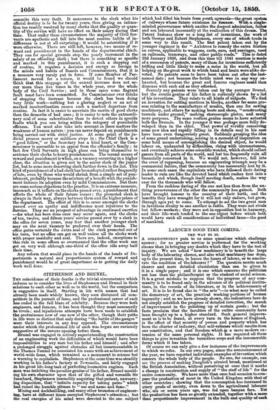STEPHENSON AND BRUNEL.
Tire coincidenee of their deaths is the trivial circumstance which induces us to consider the lives of Stephenson and Brunel in their relations to each other as well as to the world, but the comparison is suggestive in itself. Starting in life with names that had already been made widely known, they soon distanced all com- petitors in the pursuit of fame, and the professional career of each has ended in the full blaze of celebrity. Because they were both engineers, and famous, it has been thought they must necessarily be rivals ; and injudicious attempts have been made to establish the preeminence now of one now of the other, though their paths in life were so distinct that only during "the battle of the gauges" were their interests in any way opposed. The circumstances under which the professional life of each was begun are curiously suggestive of the careers opening before them. .Brunel was engaged in actively superintending the construction of an engineering work the difficulties of which would have been impossibilities to any man but his father and himself; and after a prolonged struggle against obstacles all but insurmountable in the Thames Tunnel he associated his name with an achievement of world-wide fame, which remained as a monument to science but a warning to capitalists. Stephenson at the sametime was steadily working in his father's factory at Newcastle, and fairly engaged in his great life-long task of perfecting locomotive engines. Each man was imbibing the peculiar genius of his father, Brunel mould- ing his own character upon that of the gifted and versatile Sir Isambard, Stephenson insensibly acquiring that patient, unweary- ing disposition, that "infinite capacity for taking pains" which had raised the humble pitman to "use and name and fame." Mining and dookbuilding, and many other branches of engineer- ing, have at different times occupied Stephenson's -attention; but the real energies of his mind were devoted to the one subject
which had filled his brain from youth upwards—the-groat system of railways whose future existence he foresaw. With a single- minded perseverance which excites the deepest admiration, father and son laboured incessantly at the realization of this dream. The Patent Indexes show us a long list of inventions, the work of both George and Robert Stephenson, every one of which tends in some way to this result. The first patent taken out by the younger engineer is for " Axletrees to remedy the extra friction on curves, applicable to waggons carts, cars and carriages, used on railroads, tramways, and other public ;cads." This is dated 23d January 1826, and from this time till 1641 mention is made of a succession of patents, many of them for inventions sufficien trifling and little likely to make a noise in the world, but helping on the great work to which hand and brain were alike de- voted. No patents seem to have been taken out after the last- named date ; not because the -fertile mind was in any way ex- hausted, but because the great and famous engineer mild then dispense with such aid-as they afforded. Scarcely any patents were taken -out by the younger Brunel, but the erratic genius of his father is curiously, shown by a list of his inventions. They relate 'to all kinds of subjects. We find an invention for outfai. g mortices 'inblocks, another for some pro- cess relating to the manufacture of muslin, then one for sawing machinery, and others for making boots and shoes, "-constructing tunnels under ground,' making stereoscopic plates, and many more purposes. The same restless genius seems to have actuated both the Brunels. In the younger It was perhaps more fully de- veloped than in the elder. That power of 'vividly conceiving some new idea and rapidly filing in its details may in his case have 'been even dangerously great. Suddenly grasping the idea of some grand undertaking, seizing in a moment of inspiration on some bold means of accomplishing the desired object, he would labour on, undaunted by difficulties, rising with circumstances, and eventually achieve some scientific wonder, which should collect gazers from all parts of the world, and but too frequently ruin all financially concerned in it. We would not, however, fall into the error of supposing, because an engineering triumph may be a commercial failure, that the community has necessarily lost by it. In some such cases the capitalists who have followed their daring leader to ruin are like the devotedbatul which rushes first into a
breach, and which, though itself meeting death, makes the way easy/or the thousands -who will fellow. From the reckless daring of the one .not less than from the un- tiring perseverance of the other the community has gained. Both have 'brought honour to the country of their birth, and the benefits they have wrought for it will not only endure, but grow, through ages yet lo come. To attempt to set the two great men in invidious rivalry to one another is futile. They were not rivals but fellow-workers; they were not in opposition but in harmony, and their life-work tended to the one object before which both would have sunk all considerations of individual fame—the good of mankind.


























 Previous page
Previous page